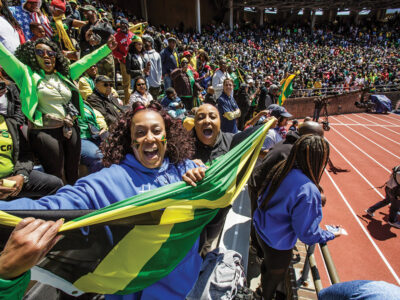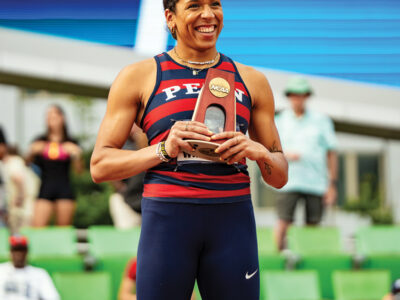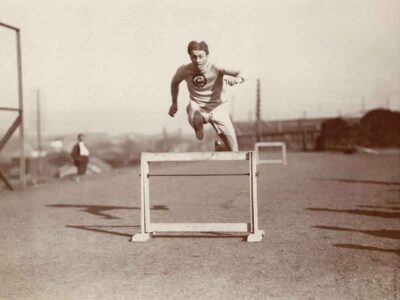Celebrating three Penn players dominant in their sports.
By David Porter
For a guy who runs pretty darned fast most of the time, patience may be one of Sam Burley’s biggest virtues. It is one of the sacrifices competitive running demands: the training cycle must be adhered to, which means buying into the idea that the ends (peaking for the bigger, end-of-the-season meets) will ultimately justify the means (sacrificing some performances earlier in the season). Hurry up and wait, in essence. All good things, and all that jazz.
Few athletes at Penn seem more suited to this regimen than Burley, a junior 800-meter specialist from Cheyenne, Wyo. On a Quaker men’s track team that consistently rose above its competition throughout the 2002 outdoor season, Burley soared highest, running the race of his career at the NCAA Track and Field Championships at Baton Rouge, Louisiana, to finish second, mere inches behind the winner. As a point of reference, consider that the last Quaker runner to place that high was Bruce Collins C’74, who won the NCAA 400-meter hurdles title in 1974.
Aiming to improve on his seventh-place finishes at both last year’s outdoor championships and the 2002 indoor championships, Burley lurked in the middle of the pack until the final turn, then passed several runners down the stretch and crossed the line in a sizzling 1:45.39, about two-tenths of a second behind winner Otukile Lekote of the University of South Carolina. Burley’s time was the third-fastest in the world this year and the fastest by an American. It also lowered the Penn record of 1:46.88 he set in the qualifying heats the day before.
“One of the track and field writers called Sam ‘The Assassin,’” Penn coach Charlie Powell said, “because he just lies in wait and picks people off.”
An unknowing observer would not have predicted such a performance after Burley ambled home in a relatively pedestrian time at the Princeton-Penn-Penn State-Villanova quad meet at Princeton on April 13, or after the IC4A championships on May 18, also at Princeton, when he failed to qualify for the 800-meter final. Those meets occurred during heavier training cycles, however, and should fall under the “means” heading.
Among the other stars who shone for the Quakers this spring, senior Tuan Wreh continued his dominance of the triple jump by winning his sixth consecutive Heptagonals title (indoors and outdoors), in the process smashing a 25-year-old meet record with a leap of 53-5 that also set a new Penn mark. Wreh, an economics major and native of Liberia, earned All-America status at the NCAA championships with a sixth-place finish (52-9). Javelin thrower Brian Chaput, a sophomore who sat out last season after undergoing elbow ligament surgery, won the Heps javelin competition with a toss of 235-9, which is the second-longest throw by a Quaker, and the coast-to-coast 1,600-meter relay team of sophomore Lugman Kolade, junior Brian Abram, Burley, and sophomore Chris Edmonds broke the Heptagonals meet record with a 3:10.37 clocking that earned the Quakers the Heps team title by a scant two points over Princeton. These and other efforts helped earn Powell Mid-Atlantic Coach of the Year honors from the U.S. Track Coaches Association.
Coach Michael Dowd’s women’s tennis team produced a carbon copy of last season, which is no mean feat considering the Quakers went undefeated in the Ivy League a year ago and reached the round of 16 at the NCAA team championships. This year Penn defeated Richmond in the first round before falling to Duke, the No. 1 seed in the region, in the second round.
The then-24-year-old Dowd was hired in 1996 as the youngest head coach in Division I, and in seven years at Penn he is 34-8 in the Ivy League and 93-38 in all matches. He scored a coup when he landed Alice Pirsu, a native of Bucharest, Romania, who had played for two years in professional tennis’s minor leagues in Europe before enrolling at Penn in the fall of 2000. After sitting out a year to satisfy NCAA eligibility requirements, as a sophomore Pirsu developed into one of the top players in the Northeast. Like her team, Pirsu rolled through the Ivy League undefeated and was named Ivy Player of the Year, and became the first Penn player to be invited to the NCAA indoor and outdoor singles championships. At the latter, she won two matches before losing in the third round to eventual runner-up Jessica Lehnhoff of Florida.
In addition to Pirsu, sophomores Sanela Kunovac and Rachel Shweky were named First Team All-Ivy League in doubles. The rest of the Quakers are underclassmen too, which bodes well for Dowd and ill for the rest of the Ivies.
Every sport has its own jargon, but few can match rugby’s for color. Prop, lock, hooker, loose head, flyhalf. It can make you feel as though you’ve stumbled onto a set of instructions from Ikea, or maybe a passage from the Kama Sutra. Game descriptions such as, “At the 24th minute the U.S. scored from a rolling maul” are common. Ruggers are dead serious about their sport, however, as anyone who has played can attest (and probably has the broken bones to prove it).
The physicality of the sport appealed to Ines Rodriguez C’97, an alumna of Penn’s Women’s Rugby Football Club and a member of the U.S. national team that competed recently at the Women’s Rugby World Cup in Barcelona, Spain. “A lot of women’s sports are emasculated versions of the men’s games,” Rodriguez told Sports Illustrated Womenin May, “but in rugby it’s the exact same sport.”
Rodriguez was one of the standouts on the U.S. team that won two games and lost two at the World Cup. She scored all nine points on free kicks in a 21-9 loss to European power France on May 18, and served as vice captain in a 17-5 loss to Australia on May 21. The U.S. team also crushed Holland, 87-0, in its first match and concluded with a 23-5 defeat of Spain on May 25. More broken bones are in Rodriguez’s future, but this time she will be mending them rather than causing them, as a graduate student in Penn’s School of Veterinary Medicine.
Sports columnist David Porter C’82 is the author of Fixed: How Goodfellas Bought Boston College Basketball.




